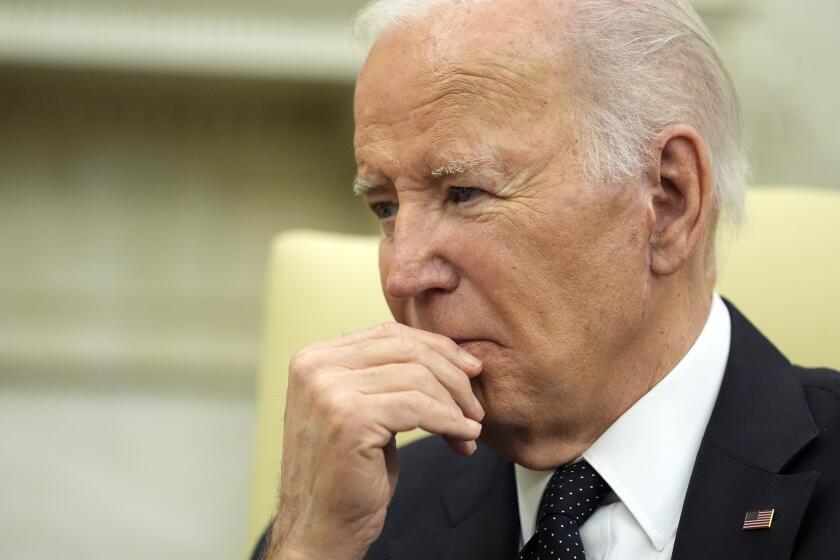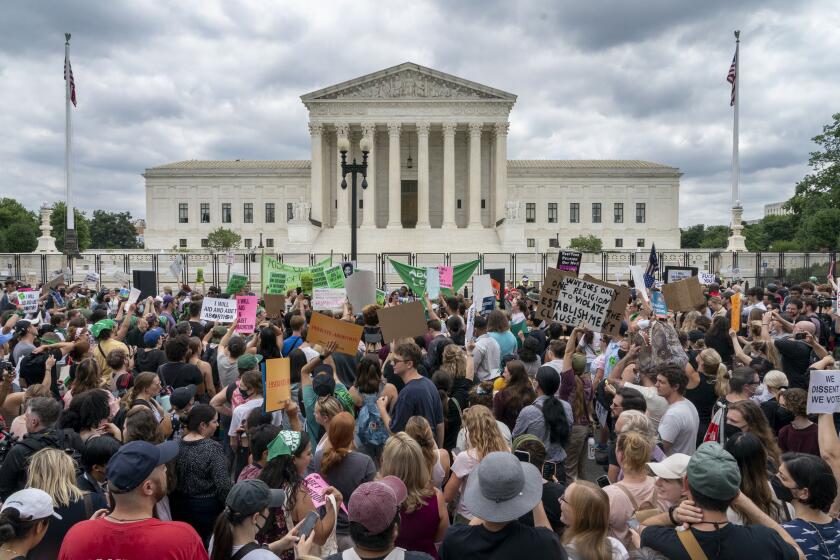Iran Holds Postwar Dilemma for U.S.
The Bush administration is reportedly weaving an Iraqi Islamist group and its patron, the Islamic Republic of Iran, into the web of war it is wrapping around Saddam Hussein. The development suggests that President Bush has effectively removed Iran from the “axis of evil” for the greater good of taking down Hussein. The administration’s apparent embrace of Ayatollah Mohammed Bakr Hakim, the Islamic group’s leader, also sets the stage for a crucial foreign-policy choice that will affect long-term U.S. goals in the Persian Gulf.
Since the end of World War II, U.S. foreign policy has played, first, Iran against Iraq, then, Iraq against Iran. During the 1960s and 1970s, when the Soviet Union was seeking influence in the Persian Gulf by delivering weapons to Baghdad, the United States armed the shah of Iran with some of the best weapons in its arsenal and appointed him policeman of the gulf. After the 1979 Iranian revolution and Hussein’s 1980 invasion of Iran, it was Iraq that became the beneficiary of U.S. affections. That ended when Hussein invaded Kuwait, kindling the 1991 Gulf War.
In its first term, the Clinton administration broke the pattern. Declaring both Iran and Iraq rogue regimes, it unfurled the policy of “dual containment.” The United States would deal with neither the mullahs in Tehran nor the tyrant in Baghdad until each rejected policies the U.S. found objectionable. But during Clinton’s second term, the frustrations of containing Hussein, coupled with the apparent softening of the Iranian revolution, led to a series of efforts to repair relations with Iran. Bush’s apparent interest in Hakim as an ally suggests he has chosen that path again.
Hakim is the religious leader of several million Shiite Muslims who live in southern Iraq along the border with Iran. He was among the Iraqi clerics who fled to Iran during Hussein’s repression of the Shiites during the Iran-Iraq War. In 1982, he founded the Supreme Council for the Islamic Revolution in Iraq. The Iranian government protected and heavily subsidized Hakim, even allowing him to create a military force called the Badr Brigade. That makes his council the only Iraqi opposition group other than the Kurds in command of any military power.
Hakim, the United States and Iran certainly share a common interest in deposing Hussein. Washington views the tyrant of Baghdad as a dire threat to U.S. national security. Hakim seeks both revenge against Hussein for past grievances and the opportunity to secure territory in Iraq from which to prepare for the struggle for control of post-Hussein Iraq. The regime in Iran regards Hussein as a dark menace on the border, one that invaded the country.
A bonus for the mullahs would be that the United States, in ridding Iraq of Hussein, would also rid Tehran of the Moujahedeen Khalq (People’s Holy Warriors), an Iranian group with a bizarre ideology that mixes Marxism and Islam. The Moujahedeen, which stages periodic raids across the border from its bases in Iraq, represents the only armed opposition to the regime in Tehran.
In light of the reported contacts between Hakim and Washington, it seems that Iran wants to work with the United States to oust Hussein. The two countries are already cooperating to stem the flow of illegal Iraqi oil through the Persian Gulf, and Iran offered help in the U.S. campaign against the Taliban in Afghanistan by pledging to rescue downed American pilots. It all adds up to the best opportunity since the 1979 revolution for the United States and Iran to reopen relations.
Whether that happens will largely depend on how the administration proceeds against Hussein. If U.S. military power is sent into Iraq this winter without a mandate from the United Nations, Iran will have little choice but to retreat into hostility toward the U.S. Iranians across the political and theological spectrum share a powerful sense of nationalism. Its emotional appeal is what saved Iran from defeat by Hussein. Nationalism was one of the core causes of the Iranian revolution. Shah Mohammed Reza Pahlavi fell not only because of the absolutism of his regime but also because most Iranians perceived him to be subordinating Iran to the United States. More than two decades since the revolution, the potency of Iranian nationalism has not diminished.
Iranian independence and identity would be threatened by the presence of American troops on its border, a given in the administration’s war scenario. It’s a reality the Bush administration must comprehend as it plots its war strategy. The mere sight of U.S. occupation forces on the ground in what Iran regards as its geographical and historical frontyard is likely to inflame Iranian nationalism, and the longer their stay, the more severe the possible reaction. With the opportunity to engage Iran sacrificed, the United States would have little choice but to weigh occupied Iraq against belligerent Iran.
The high-wire balancing act between Iran and Iraq that the United States has practiced for more than 40 years has never been good policy. It has ignored the obvious truth that the Persian Gulf is a region. One side is Arab, the other Persian. To ensure the free flow of oil at reasonable prices in the gulf, the primary U.S. goal since 1973, the United States needs both Iraq and Iran.
This geopolitical necessity is yet another in a long and somber list of reasons why the United States needs to think long and hard before toppling Hussein in a solo act. Even the world’s only superpower cannot escape the real risk that quick invasions can become long occupations. And temporary allies can too easily become long-term enemies.
More to Read
Get the L.A. Times Politics newsletter
Deeply reported insights into legislation, politics and policy from Sacramento, Washington and beyond. In your inbox three times per week.
You may occasionally receive promotional content from the Los Angeles Times.






